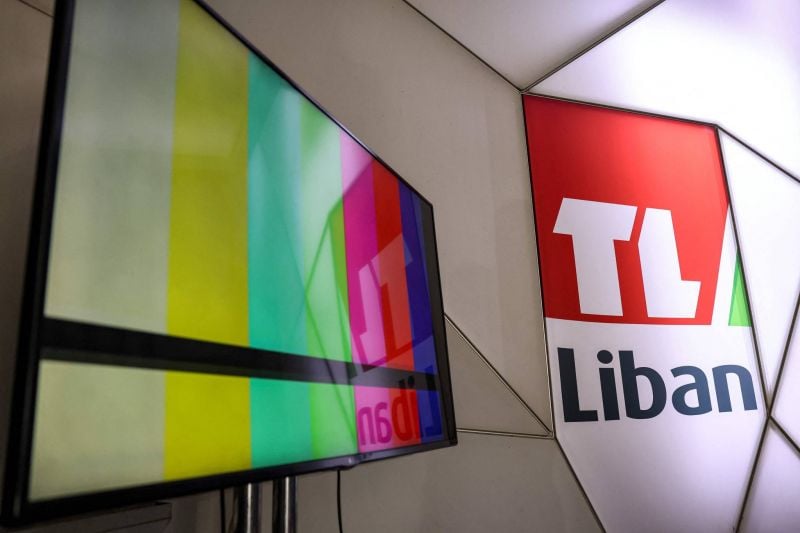
Inside Télé Liban's headquarters in Beirut, Aug. 11, 2023. (Credit: JOSEPH EID / AFP)
BEIRUT — After a day of interruption of Télé Liban, Lebanon’s only public television station, the broadcast was resumed Friday night.
However, a rerun of an old series is currently aired, with the statement “We will remain on an open strike until we receive all our compensation,” at the bottom of the screen.
Lebanon's Information Ministry on Friday "temporarily" shut down the Télé Liban. The move came as employees remained on strike and were demanding improved wages, a source at the Information Ministry confirmed to L'Orient Today.
The source added that the TV station has not been airing its regular programs for several days, with employees protesting the deterioration of their working conditions and the severe drop in their salaries due to the depreciation of the national currency.
Executive producer at Télé Liban Patricia Samaha told L'Orient Today that the decision to shut down the state-run station is temporary.
"Télé Liban is the TV station of unity and the homeland," Samaha said. "It should receive more support."
Severely affected by Lebanon's financial collapse, public servants from various sectors have repeatedly held protests and strikes to demand an increase in their salaries.
Dead end
Samer Hana, an employee at Télé Liban and a member of the Télé Liban's Employees Syndicate, told L'Orient Today that employees have been observing an open-ended strike since Aug. 3, to demand money owed to them be paid, which he said is now months overdue."We have been working for free," Hana said.
"We have been constantly promised that our salaries will improve, but nothing has happened yet, and we have now reached a dead end," Hana added, saying, "I can't even make it to the office with the salary they are paying us."
Hana explained that employees at Télé Liban have been paid the same salary they were paid prior to the economic crisis despite the depreciation of the Lebanese lira, in addition to half that salary and LL450,000 per day as a transport fee, which came into effect around two months ago.
"We are against the [shutdown] decision," Hana said, claiming that the decision to shut down broadcasting was taken solely by the caretaker Information Minister Ziad Makary to exert pressure on employees to end their strike.
'A portion of the staff'
"Télé Liban has not been shut down, and I have no intention of doing so," Makari told L'Orient Today.
"We are trying to address the problems, and most of the employees’ demands have been fulfilled," the minister said, adding that he has secured around LL23 billion for the TV, without specifying where he got the funding.
"Télé Liban will resume broadcasting, and we will work with a portion of the staff," Makari continued. "Another portion of the employees has already resigned from the [channel's] syndicate."
The minister said the public institution has only 20,000 liters of diesel to power its broadcasting and he refuses to use it to air "classical music."
In the afternoon, Makari insisted in a statement that he did not announce the permanent closure of TL, but “decided to freeze the broadcast, in the interest of saving public money.”
Another source at Télé Liban, who preferred not to disclose his name as he is not authorized to speak to the press, told L'Orient Today that "it remains an unofficial decision to turn off the broadcast," as shutting down the public institution is outside the information ministry's jurisdiction."
"The last thing we wanted was for the broadcast to be turned off," the source said. "It is like the eyes of the homeland were turned off today."
For his part, the same source saw the decision to shut down Télé Liban's broadcast as a "positive move," saying, "I am sad, but I also understand such a decision when some employees have been getting paid LL2 and LL4 million" per month, equivalent to around $22 and $44, respectively.
'Stunned'
Télé Liban's Employees Syndicate announced Friday that the Lebanese people and TL employees were "stunned by Makary's decision."
The statement added that the Syndicate "rejects any harm to the broadcast of Télé Liban and bears the full responsibility to the person who takes such an unfair decision."
The Syndicate noted that it "was about to suspend the strike" and added that the "minister asked to stop spending money unless the strike is stopped."
The Syndicate addressed the minister, saying that "the problem with you is not personal, the problem is that we did not receive our rights for more than two years."
Finally, the Syndicate announced that its "sole motivator is the protection of the employees' rights" and decided to continue the strike.
"TL employees have been among the most oppressed and unfairly treated public sector workers in Lebanon for decades," said General Labor Union leader Bechara al-Asmar in a statement relayed by the NNA. "The delay in implementing social assistance and the rising cost of living for these employees have exacerbated their suffering and worsened their economic and social conditions ... As a union, we stand with them and support their legitimate actions to secure their rights.”
Asmar also called on TL employees to give the agreed-upon financial execution of their compensation and due salaries a chance, resume work, and engage in immediate constructive dialogue with the Minister of Information to secure their full rights and restore Télé Liban.
The establishment of Télé Liban dates back to the end of the 1950s, and it was initially completely owned by two private companies — Compagnie Libanaise de Télévision (CLT) (channels 7 and 9) and Télé-Orient (channels 5 and 11), before it merged in 1978 in a deal that saw ownership equally spit between the public and private sectors. Then, in 1996, the state acquired the private sector shares, and since then the station has remained completely owned by the state.
